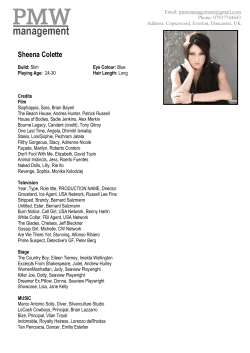
Emma Thompson’s Diary
4 LIVI NG Sunday Independent 6 March 2011 Emma Thompson’s Diary ‘One girl started to bleed excessively. They tied a noose around her neck and dragged her until she was dead’ FEBRUARY 5 THE FIRST thing I learn is the Liberian handshake. A series of squeezes ends with a click of your fingers. Liberia's founders were the children of people who'd had the tops of their third fingers chopped off to identify them as slaves. The finger-click is a firm but playful indication that their offspring were anything but. Atop the highest point in Monrovia sits the dusty ruins of the Palace Ducor Hotel. Abandoned by its owners in 1990, this huge Intercontinental was used by the warlord Charles Taylor as a barracks. From the wreckage of the coffee-lounge terrace you can see the shanty-town of Westpoint stretching to the horizon. We walk into the empty swimming-pool. Children used to slide down it on plastic trays but the place is razor-wired off now. We leave the haunted space and spend two hours in Westpoint. It's wild. Winding pathways through mud houses set cheek-byjowl, women selling giant spoons made from recycled tin-cans, piles of the ubiquitous and fierce Liberian peppers, dried and fresh fish, chicken-feet, various hooves, pettytraders stalls dealing in tiny bags of herbs, salt, chickenstock, squalling babies, battered motorcycles buzzing and tooting, humans on a constant roar. Tindy is so happy. “I want to stay here for at least a month,” he shrieks. Here, the young outnumber the old by a huge margin because of the 30 years of conflict. Liberians call them World Wars I, II and III. They only ended in 2003. Getting out of the shanty to a better life is tough. It's not just who you know but what your name is. An Americo-Liberian name like Dennis, Johnson or Thomson (inherited from the inventors of the handshake) will get you in the door. An indigenous name like Kollie, Saki or Towaye will get it slammed in your face. FEBRUARY 6 LEAVING Monrovia westwards, we pass several check-points called “gates” where, during the wars, strange tortures were meted out. Korto Williams (ActionAid's country director) points out someone selling a pile of whelk-like shellfish. “We call them ‘Kissmes', she says, “because you bite off the pointy end and suck out the flesh. They used to say to people ‘swallow 10 of these whole and I won't kill you'. But if you swallowed 10 you'd be dead anyway”. We stop to greet the district commissioner and meet our first female town chief. An old man sits listening as she says that one of the greatest problems in the country is rape, which is endemic. Rape within marriage has just been recognised under the law. The old man leans back and closes his eyes. I assume he's tired but am told later that it was intended to show his disrespect. He thinks the whole idea of rape within marriage is ridiculous and has withdrawn from the discussion. We reach a town called Karnga in one of Liberia's 15 counties, Grand Cape Mount. There, I meet Massah, a 33-year-old woman with four children. She went to school until she was six, when the war put a stop to it. Later, rebels killed her husband and raped her. Her mother was killed during the next wave of fighting. She's exhausted, having spent all day foraging for food in the bush and all night looking after the babies. But she says that taking part in ActionAid's Reflect programme, a model for peace-building and leadership skills, has helped her feel less alone and more able to take part in decision-making. Yatta lives in the room next door. Her husband tried to stop the soldiers from raping her and was shot dead. “I want to make soap,” she says. “Everyone needs soap.” Next door, Jenneh, who has had a pain around her heart and lungs ever since she was gang-raped, says Reflect helped her to speak to people without being aggressive. “Violence here has dropped away enormously since ActionAid arrived. All we need is a living…” I find Tindy in a green football shirt from a set that has been hired by ActionAid for a game. Everyone walks down to the pitch to cheer and dance. Joanna Kerr, ActionAid's new and first female CEO, a Canadian alight with articulate passion for women's rights, says the leaders of the community are more impressed by this than by anything else we've said or done. Normally, they say, people come and listen as briefly as possible and then leave. “We know you are interested in our difficulties,” they say. “The fact that you are also willing to share our joys shows a different kind of leadership.” FEBRUARY 7 ON our way to Gbarpolu county, a white van nearly crashes into us. As it drives off, Tindy points out that the sign on the back reads “God is in Control”. “Ha!” he says. When we arrive, the school we were to visit is closed — there is no cell phone coverage so no-one has been able to warn us. Instead we visit another where the classes are a mixture of grown men and students as young as eight. The men are ex-childsoldiers whose education ended when they were kidnapped. It doesn't look like it's working. I spend two hours with women and girls who have been on a project designed to tackle violence against girls in education. Twentytwo-year-old Vera leads the discussion. “Here's what prevents girls from getting educated — early marriage, teenage pregnancy, traditional beliefs and practices, poverty and rape, lack of parental support — my mother never went to school so she thought there was no point in me going either. But here's the other problem — tell her” she says, turning to another girl, A very beautiful 15-yearold says. “I had just taken my exams and asked my teacher for my grades. He said he had failed me. I was shocked and asked to see my papers. He told me to come to his house and he would give me better grades…” She didn't go but many teachers trade good grades for sex. In the same community, ActionAid has been working with another female chief called Jenneh. We have a private discussion after the formal meeting: “I don't know how old I am but I have four brothers and three sisters. One brother was killed in the war. We heard fighting was coming in 2003 so we all ran from here. The rebels caught me and my husband with our little girl. They put my husband in jail and took me as a bushwife. My little girl cried herself to death. When ActionAid came, they made me brave. After the training, all the women wanted me to stand for election. After I was vicechief for two months, both men and women voted me in as the new chief.” I ask how she uses her power. “I help people to solve their issues without lawyers.” Tindy asks how she enforces those decisions. “I give them time. People come to me when they are vexed. I help them to wait before they leap against each other.” I tell Jenneh we have an appointment with her NEW WORLD: Oscar winner Emma Thompson and her adopted son and ex-child soldier Tindyebwa (Tindy) Agaba talk to Beatoe village chief Jenneh Sando president and ask if she has any message. “I only want one thing. You see these roofs?” She points to the thatch on the circular huts. “These roofs are terrible during the rainy season. I need corrugated sheets for 300 roofs. That's all I want.” FEBRUARY 8 I'VE learnt the traditional Liberian greeting: “What news?” you say. “No bad news,” they reply. Two-and-a-half hours north, we are welcomed with enormous gratitude by a farming community in a cathedral of towering palms. Korto and Joanna say, “You owe us nothing. We are only here to help you get what is yours by right.” A small, rounded woman called Mamie shows us round with her eleventh baby strapped to her back. Only five others are still living. “I'm maybe 43? I only know because I remember President Tolbert was in power when I was little. There was no farming during the wars — we survived on relief. After I did the ActionAid training, I found 35 women and seven men to join my farming project. They need a lot of encouragement because it's hard work and long hours. My husband won't do it, he says there's no point.” “But he still eats the cassava when she brings it home,” says Grace, who is the wise and witty district commissioner. Mamie grins and says: “This community is now self-sufficient and we want to be able to export — why can't the country feed the city?” Tindy and I help Mamie carry a huge tub of sweet potatoes to her village. Mamie pops it on her head and trots, hands-free as though it weighed nothing. Tindy finds it easy after his childhood water-carrying years. When I put it on my head, I can barely stagger 50 yards and have to clutch it with both hands. On the way, Mamie describes her home economies. “If I sell all these potatoes, I'll get about $5. Then I can buy fish or meat for the family. If I don't sell them, we'll just live on them instead.” She has a livid scar on her ring finger, which was made by the bullet that killed her mother. Forty minutes later we reach her village. There's an older man sitting in front of her house. He's not very friendly so I try and charm him by extolling his daughter's skills. “She's my wife,” he says, disgustedly. FEBRUARY 9 AT Liberia's first women's radio station, I meet a journalist who tells me the story of a 10-year-old girl who, according to custom, was taken by her grandmother into the bush to be initiated into the Sande Society, the traditional female organisation. Along with 25 others, her clitoris was cut away, the same knife being used for all. One of the girls started to bleed excessively. They tied a noose around her neck and dragged her about until she was dead. All the women made loud noise as this occurred. The 10-year old asked her grandmother why. The old woman told her it was not permitted to die alone in the forest and her family would be told that the devil had taken her. Then the child asked why the women had made all the noise. This was in order that her screams not be heard in the village. Next, the initiates were made to lie on the ground where they were covered in fresh grass. They had to lie for three days without food until the grass was dry. Then a meal was prepared. There were little knobs of meat in the food and when the child asked what they were, the grandmother said that if the clitorises were eaten in this way, it would ensure that any child who dared to speak about what they had seen would surely die. Female genital mutilation is still common in Liberia and to speak out against it is very difficult, even for the president. The afternoon is spent with 30 women from all over the country who are all partners of ActionAid. Annie, who has travelled three days to get here and has 15 children, offers this: “Where I come from, they say women's ideas cannot go very far. Women's ideas stop just below”, and she cups her breasts. Everyone laughs. “When a woman is pregnant with a girl-child, according to customary law, a man can buy her while she is still in the womb. The price he pays goes not only to the father of the girl but the whole family. Then a second bride price is paid for the girl when they marry. So you see, the community feels it has paid a huge double price for this girl and her own family have all received benefits from her sale. To whom can she complain if she is beaten or abused?” “But if I buy a pair of shoes I look after them. Don't you want your property to remain in good condition? Why is there so much violence?” asks Joanna. “They want their property to remain quiet and under their control,” answers Annie. This customary law is upheld by the modern Liberian Constitution. Annie and I walk in the forest and she shows me the trees and plants she uses to cure toothache, bring on childbirth, heal paralysis and stem bleeding. She often helps others with her medicines. “Don't they regard you as a witch?” I ask. “No. I just show them the plant and tell them how to use it. It's always better to share your power. That protects you and makes people respectful and grateful.” FEBRUARY 10 TODAY I spend a very emotional morning watching Tindy talking with a group of ex-child-soldiers. Most of them share the same story — they were kidnapped around 14 years old, although one of them, Benjamin, was taken when he was just nine. He says: “Guns were our mothers and fathers. They protected us, they got us food.” Tindy agrees. He says: “Being a soldier makes you strong in some ways. It makes you want to enjoy life because you have missed so much of it. Laughter must be your new weapon. I lost my laughter when I was in the army but I rediscovered it and it helps me with every part of my life. When I first got out, I could hardly speak. An office with lots of people in it was simply impossible for me to deal with. But I had to learn how to act with institutions. Without those skills, you cannot move forward. There are places out there for you to explore and use.” There is a child protection officer at the meeting called Onike, who has known some of them for years. She says: “People will say to these guys, ‘Well I didn't make you go and fight, so don't come running to me.’” Benjamin again: “We were cut off from our peers. While they were learning, we were fighting.” The terms “ex-child- soldier” and “ex-combatant” are now being replaced with “war-affected youth” to try and reduce the stigma. There are 60,000 of these young men in the country. Later, in the coldest room in Africa (I think the air-conditioning unit was on the blink), we meet President Ellen Johnson Sirleaf, Africa's first female premier. Her Wikipedia entry neglects to mention that it was the demonstrations of thousands of women all dressed in white that ensured her victory over Charles Taylor. She is quietly spoken, dignified, steely and humorous. Impressed by the transparency of ActionAid (every cent of its $2m budget is accounted for to local government), we feel hopeful that she will allow her office to engage with Korto on a regular basis — she was clearly taken with her brilliant countrywoman. FEBRUARY 11 IT'S Armed Forces Day. Time to leave.I greet everyone we meet with a cheery “Happy Armed Forces Day!” Every single one of them just laughs. • Emma Thompson visited Liberia with ActionAid. Olga McDonogh, CEO ActionAid Ireland, said: “ActionAid works with local communities helping women and girls to understand what their legal rights are and supports them to take legal action to enforce these rights. This is done through formal and non-formal education. In countries such as Liberia where Women’s Rights are not enshrined in the law we work with local and national partner organisations to change this.” To find out more and support their work visit: www.actionaid.ie or call on locall 1890 704 704. Jenny’s furnished with talent of a top designer Having won the acclaim she deserves, Jenny Walsh is now becoming a pivotal player in the world of design, says Andrea Byrne ‘Y OU can’t put a price on doing something you love,” furniture designer Jenny Walsh says, explaining her decision to leave a well-paid job as a manager in one of Boston’s best restaurants to return home and fulfil her dream of designing furniture — an ambition guidance counsellors in school had advised her to stay well clear of. “After three and a half years in America, it was beginning to feel more like home than Dublin, so I thought either I go home now or I stay forever,” she smiles. Thankfully, the gamble paid off. Jenny is making quite the impact on the Irish design landscape. She was even chosen as a member of the Cream of Irish Design, which is a massive coup considering she wasn’t long out of college when she was selected. Bbecoming a member also meant she found herself working alongside the very people she had been studying about in college. Colourful and quirky, Jenny’s style of design is geared towards a more modern house. “If I design a cabinet, it’s not a variation of the cabinet; it comes from a completely different place. It’s from a story, from a sketch of a person, fairytales. Hopefully, that comes through,” the petite designer says softly. Jenny graduated from Colaiste Dhulaigh in 2007 with a Higher National Diploma in Spatial Design. In a testament to her ability, she was offered a part-time teaching position. Asked why she thinks she was chosen over her contemporaries, the 28-year-old designer from Sutton in Dublin is loath to reply for fear of appearing cocky. Pressed, she says: “I guess it’s because I would spend more time showing other people in the class how to do something, than actually doing my own work. I guess they probably saw that,” she shrugs. Jenny also went on to obtain a first-class honours degree in Interior and Furniture Design in DIT. She arranged for seven Irish designers to show their creations in London, in what is the furniture design equivalent of London Fashion Week. “It involves a lot of paperwork to try and get funding from wherever you can. The Irish Government is the only government that doesn’t send a country pavilion. It would help exports so much if they put the Irish designers there. “Furniture buyers from all over the world go to this show. If you’re not at it, you don’t have much hope,” she says. Many people have been encouraging Jenny to move to London to further her career but she’s keen to make it here first. “The cream of Irish design has just been phenomenal in their help with it in trying to make it happen TABLE IT: Jenny Walsh is out to cut prices. Photo: Tony Gavin here”, she enthuses, crediting fellow designer and “mentor” Shane Holland. Jenny is based at the Duff Tisdall Interior firm in the Malthouse Design Centre in Dublin. They have just revamped their showroom and are opening an exciting new initiative in the coming weeks. More than anyone, it’s the consumer who will benefit, as a handful of resident designers have set themselves the challenge of making a unique piece of furniture that will retail from between €80 and €200. How does she plan on keeping costs low while still being creative? “It’s about pooling resources. There are five of us at the moment working on the project. It’s about being very clever with your process, and making sure you get as much as possible from your material. It’s great to design something and win prizes ... but if it’s too expensive for people to buy, what’s the point?” Jenny also has a pop-up shop in the RHA and is working on a project for an English furniture manufacturer. While she would never turn down a top design job with big homeware companies such as Ikea (she’s a big fan and credits them with giving us a better appreciation of design), Jenny likes the control that working for herself affords, particularly when it comes to ethical and environmental aspects of her job. Her ethical practices even extend to what she wears. “It really limits where you can shop,” she laughs. Future aspirations for the young designer include branching out to do “more unusual, more sculptural” pieces and eventually open her own shop. But, as she says herself: “I guess the Malthouse initiative is the first step towards that.” www.jennywalshdesign.com The Malthouse Design Initiative is on April 7. For information see themalt housedesigncentre.com
© Copyright 2025


















